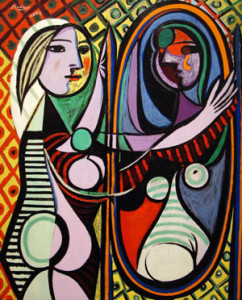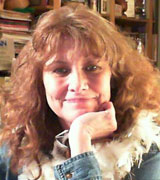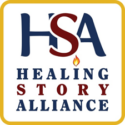
DIVING IN THE MOON
HONORING STORY, FACILITATING HEALING
The Story We Tell Ourselves
© Lorna MacDonald Czarnota
The art of storytelling brings forth many images—children, elders, comedy, tragedy, audiences large and small, but we may not consider how we tell stories to ourselves, or more specifically, about ourselves. This is particularly relevant to us as healing storytellers.
Healing through story takes many forms. Research and experience has shown a change in emotional, mental, and physical wellbeing as story reacts within the human brain. We use healing story to create peaceful communities of all sizes and types, from cities right down to the most basic of families. But what about healing self? What about the power of our personal narratives to change the course of who we are and how we interact in our environments? Is overcoming life’s setbacks, or more serious ailments, really as simple as telling a new story? As a healing storyteller who has used this technique personally, I’d like to offer a resounding, “Yes!” But there is a bit more to the process that I’d like to discuss in this article.

First, it is crucial to believe the process is effective. Resistant listeners will close themselves off from the possibility of how well this works. In an interesting way, they are telling a narrative by doing so. The human brain is a powerful machine that runs the physical system of our bodies. If the brain dictates to any one organ that an imbalance exists, that organ (as long as it is healthy) responds to restore balance. Yet, the same brain has the ability to be trained to send specific messages we give it, rather than act on instinct alone. That’s astounding! How empowering! We are not robots. We can control our own input and output!
The Second step in the process of changing our personal narrative is acceptance. Once you believe you can control your destiny, wellbeing, and joie de vivre, you must accept it as truth.
The stories of who we are, how we feel, and in what ways we should react come at us from so many outward sources. We’re bombarded from the very moment we receive life. Yes, even our own bodies tell us stories—I hurt, I’m tired, I’m short, I’m fat, I’m hungry. Our parents and other family members tell us stories—you are special, you are lazy, you are smart, you are slow, you are…the list goes on and on. Certainly, product advertising plays a role in our self-image, too, not only by the images it presents as “the norm” but the questions it asks, “Are you tired, listless, in need of more energy?” Can you imagine an ad saying; “You’re feeling just great with all the vitality and energy you need to conquer your world!” No, of course not. Advertising’s function is to sell you something and therefore it needs to create a perceived need. Believe it or not, I think we are conditioned to do that to ourselves. When someone asks, “How are you feeling,” our natural process is to ask ourselves “What’s wrong with me today?” Think about how much more powerful it would be to ask yourself, “What’s right with me today?”
In addition, if we go back and substitute “advertising” for “controlling individuals,” don’t they in fact tell us stories about who we are? Most often, those stories are meant to be damaging.
Narratives others tell about us are often easily accepted as fact. I truly believe we need to question those stories, but how do we begin to see them for what they are?
We must realize nobody who truly cares will ever tell a negative story about us without offering a way to make it positive, unless…they lack that ability.
Our parents love us, but not all parents have good parenting skills, because of this there is a plethora of young adults, and even mature adults, whose childhood stories came with good intentions but no warranties, and no support services.
So what does this mean for us, the healing storytellers? Two things. We need to help parents develop skills where the stories they tell about their children (to the children and to others) come with “turning-point” knowledge—suggestions that what’s going on is temporary and there is a way to make it right. Healing storytellers also have many opportunities to help the adult community with its story. Ultimately, we need to start with ourselves and work outward.
How to Change Personal Narrative? The idea of personal narrative isn’t new, but the in-depth process is one I only recently began exploring. I’d like to share this personal experience.
Growing up, my family had little money. My mother worked two jobs so my dad could go to college. We ate modestly with little opportunity to indulge in ice cream or anything beyond the basics, and never went out to a restaurant. My mother handmade much of our food—baking bread and canning. We didn’t own our home and we only had one vehicle, a beat-up old Ford Mercury that smoked if we drove uphill. I wore my cousins’ hand-me-downs, and my sister wore mine. But I never once heard my parents call us poor, and I never once considered that we might be. In fact, I was more likely to hear my mother talk about those who had less than we did, when we didn’t have all that much.
The very first time I thought of myself as “poor” was only recently when circumstances outside my control cut my paid work back to what it was ten to fifteen years ago. I could no longer pay for health insurance. In applying for new insurance, I ran into the government numbers that showed just how “poor” I really was. It scared me as much as the breast cancer I fought five years ago, and that was frightening enough. I also had a cousin who found himself living in his car at this same time, which added to my anxiety. I was a shoestring away from being like him, except that I have a lovely life-partner, a paid mortgage, and money in the bank. The only reason that was not consoling is that he was once quite well off. This could happen to anyone. What a realization!
Suddenly, my narrative changed, and I was not immediately aware it had done so. I went from being a storyteller and author with an exciting, vibrant lifestyle to being poor and scared and worried about my future. I developed some physical ailments I hadn’t had before, which may or may not be connected—after all I’m not twenty years old anymore (oops, that’s a narrative right there.) I had just told myself it was okay to feel tired, have the aches and pains, and all because I’m aging. That was when I took real notice of “my story,” and the excuses I allowed to justify being miserable. Added to that revelation, friends advised me to consider government assistance since I earned it over the years and paid into the system. I knew their intentions were good, but why should it be okay to be in need in a way that requires such help? That was the real question. Once I realized it’s neither right nor wrong, good nor bad, it just happens to be part of my journey—because I already believed in the power of story—I told myself a different narrative. It goes like this:
“Sometimes we hit a bump in the road. We can sink into the hole opening beneath us, hold on for dear life, or take a leap of faith. What is the measure of success? Is it really how much money we make? How much money we have? The things we have acquired? Or is it something else? For me, it is legacy. It is the culmination of all we have done, accomplished, and even failed to do. The sum total of who we are. So, who am I? What story should I tell myself so I feel good, purposeful, whole and happy? Well, it isn’t ‘I’m poor and sickly.’ No, that’s not who I want to be.” I took the leap. I thought about this for a time, then projected it back at the outside world. “The story I want others to tell about me, both to me and to each other, is the story I should tell myself! Absolutely!”
Here is the story I want others to tell and so it is my personal narrative.
“I am a fabulous storyteller and accomplished author. I am a lovely woman, and a kind, compassionate person.”
And the beauty of it is, I do feel better, I have been more productive, and my mood makes living with me much easier.
Is this a cure-all? Well, is anything?
Even the pills and treatments from professional doctors work best for patients with the will to be healed. We can and do make ourselves sick, so isn’t it possible we also make ourselves poor, unhappy, lonely? Again, I offer, “Yes!” It is possible and people do it everyday. Therefore, it stands to reason we also have the ability to change the course of who we are and how we interact with our environments in the same way.
Tell the new narrative. Make it a positive one. Believe it works. Change who you are and how you feel. The power of personal narrative is evident in the ways in which bullies interact with their victims, and amazingly, we often bully ourselves. It’s time to stop doing that.
Words have power over us. Our stories are our words and they define us. Let’s not define ourselves in anything less than the most we desire to be, and let us learn to ignore the words of those who do. Don’t let others define you. Tell your own stories.
As healing storytellers, we can help others with their narratives, first by listening to their existing stories, then by teaching them how and why they should tell new ones. We also need to do it for ourselves—realizing these narratives are flexible, and keeping them positive. It’s fundamental in working with communities in crisis, as well. We need to realize there are choices we can make. Healing might come just from the empowerment of knowing we have that choice. Should we tell the story of our victimization or our survival? Which will most likely help us overcome adversity, heal, feel happy, and be all we can be?
Take control. Tell your own personal narrative, and help others find theirs.
 The Pool
The Pool
Retold by Lorna Macdonald Czarnota
With permission from Discipleship Resources in Nashville, Tennessee
Source: Dancing with Words: Storytelling as Legacy, Culture, and Faith by Ray Buckley
Once there was a pool deep in the forest. It was quiet and peaceful.
The pool could see the river running to the ocean and hear the ocean waves.
A tree grew beside the pool – a tree with roots deep into the earth. Every now and then, the tree cast a leaf on the tranquil water as if to ask “Are you still there?”
The dragonflies flitted around the pool, sending tiny ripples to the shore as their gossamer wings touched the surface.
The four-leggeds came to drink from the pool and the two-leggeds came as well. They sat for hours on her banks.
But one day, something happened. The spring and summer became autumn and then the skies over the pool turned dark and her waters blackened. She became sullen and silent. Not even the animals or the men came to her. The tree dropped its leaves but the pool said nothing. The dragonflies saw her sadness and they told the tree. The tree told the wind and the wind whispered across the river. The river ran to the ocean and soon everyone knew of the pool’s sorrow. The old woman of the ages “the Ancient One” heard the news and she went to the pool.
“Why are you so dark and silent?” she asked.
In a voice thin and frail the pool replied, “Because I am nothing. I can see the river run, but I have no legs. I hear the ocean but I cannot make waves. The two-leggeds and four-leggeds seldom come anymore and when they do, they do not speak to me. I feel alone. I am nothing.”
The old woman threw her head back in a laugh that shook the ground. “You are very important! You are constant. You are never changing. People rely on you. The animals rely on you. You are the one others come to!”
If a pool could laugh, it did. Its waters splashed and played and rippled with joy. And now the pool had a different story to tell about herself, and she was happy.

 Lorna Czarnota is an award-winning storyteller and author, delighting audiences in schools, libraries, organizations, festivals and conferences, nationally and internationally.
Lorna Czarnota is an award-winning storyteller and author, delighting audiences in schools, libraries, organizations, festivals and conferences, nationally and internationally.
She holds a Bachelor in Creative Studies for Young Children, a Masters in Special Education, and certification in Trauma Counseling. She is the founder and executive director of Crossroads Story Center, Inc., a not-for-profit for reaching at-risk youth through story, and author of the acclaimed book series, “Dancing at the Crossroads.” Healing story consultant work includes programs for abused women and their children, runaway shelters, transitional homes for young woman, residential treatment facilities, and communities in crisis with a goal for rebuilding community focus and insight. [email protected]
